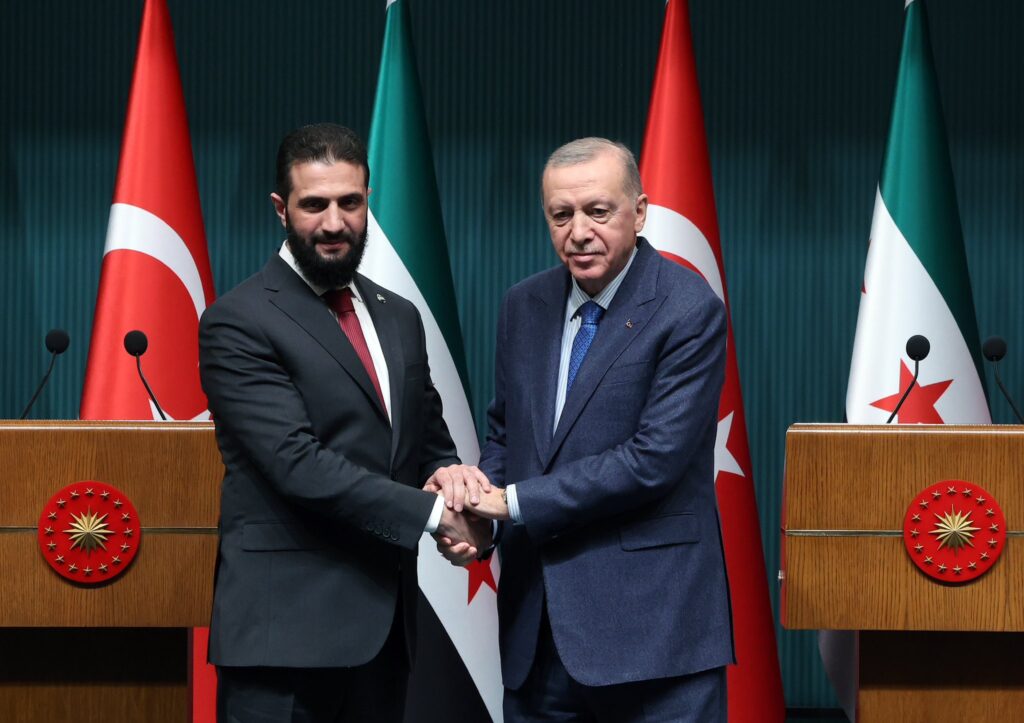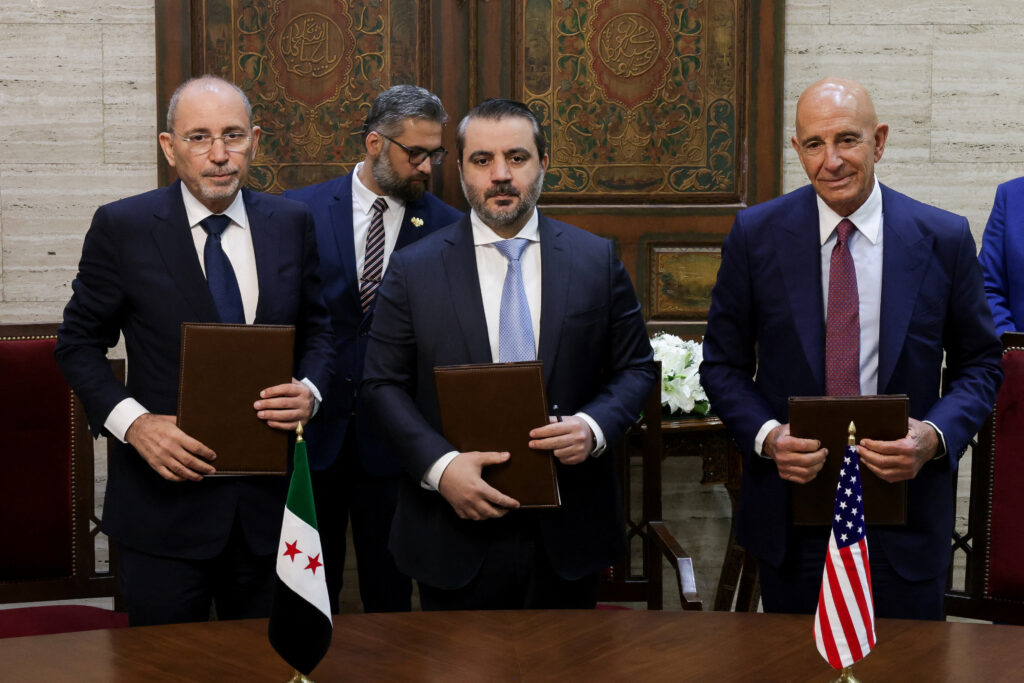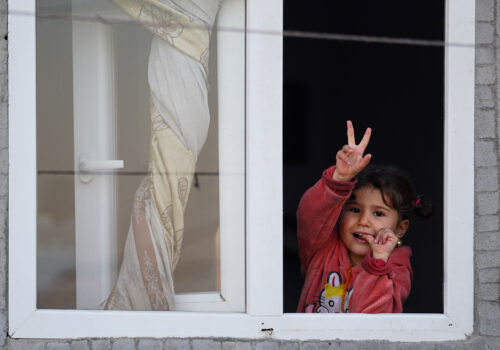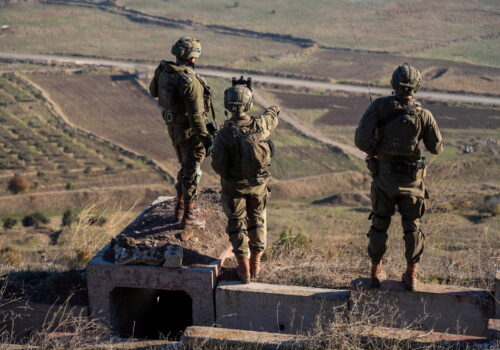Is a new era of Turkey-Syria economic engagement on the horizon?
In the years before Syria’s civil war, Ankara and Damascus cultivated an unprecedented level of political and economic cooperation, facilitating a surge in trade that saw Turkish exports to Syria peak at almost $1.7 billion, according to the United Nations COMTRADE database on international trade. The Syrian conflict that launched in 2011 initially shattered those gains, but Turkey gradually rebuilt its commercial footprint, with exports reaching $2 billion in 2023, according to the Observatory of Economic Complexity (OEC).
Now, after the fall of Bashar al-Assad’s regime last year, Ankara sees an opening to elevate economic ties with Syria beyond prewar levels. For Turkey, this is not merely about trade—it is about leveraging economic integration to drive reconstruction, foster regional cooperation, and create conditions for refugee returns, while ensuring that Syria emerges as a bridge to the Arab world rather than a burden to it.

On the other hand, at the joint meeting in Damascus, which was also attended by author Ömer Özkızılcık, Syrian President Ahmed al-Sharaa emphasized the strategic importance of the Turkey-Syria-Jordan trade and supply route. The opening of this route, which was agreed upon at the tripartite summit held in Amman in recent weeks, could revive the south-north trade flow that has been disrupted for a long time due to the civil war in Syria and the fight against the Islamic State of Iraq and al-Sham (ISIS) in Iraq. With goods and commodities collected by the Gulf via its ports passing through this route, Syria has the potential to become a vibrant trade hub again by taking on a transit role.
SIGN UP FOR THIS WEEK IN THE MIDEAST NEWSLETTER
The Turkish economic rationale in Syria
In 2010, Turkey enjoyed strong political and economic relations with Syria. A landmark visa-free travel arrangement allowed citizens of both countries to cross the border using only their national identity cards. The outbreak of war, however, caused exports to collapse. Over time, as highlighted by the OEC’s trade metrics, Ankara managed to revive trade, primarily flowing to opposition-held areas under Turkish protection.
Now, Ankara’s prospects for investment and new economically attractive agreements are significant in Syria, particularly in reconstruction. Turkish construction companies are well positioned to profit, competing on a global scale only with Chinese firms. Yet, Damascus lacks the financial capital to fund major projects as it re-builds a new government and recovers from years of conflict in Syria, and Turkey itself has limited capacity to provide credits or funding given its domestic economic constraints. Recognizing this reality, Ankara seeks to enhance cooperation with Arab and European partners. For instance, Turkey along with its regional Arab partners, has pledged a total of $14 billion for infrastructure development in Syria. Arab and European states would supply financing, while Turkey contributes expertise and operational capacity—an arrangement designed to deliver benefits for all parties.
This economic rationale also aligns with Ankara’s broader geopolitical vision for Syria. Rather than creating a dependent proxy, Turkey aims for Damascus to function as an independent actor and a bridge to the Arab world. Turkish Foreign Minister Hakan Fidan frames the situation with these words: “Syria is an independent country, and we are now faced with a new Syria. It is necessary to allow this Syria to design its own defense policy, its own foreign policy, and its own regional relations.” Ankara’s objective is not to shoulder Syria’s burdens alone, but to transform the country from a region of conflict into a region of cooperation.
Finally, Turkey views economic investment as a powerful tool to stabilize Syria’s transitional phase and to accelerate the return of refugees. Since December 8, nearly half a million Syrians have returned home from Turkey, illustrating the direct link Ankara sees between reconstruction, economic stability, and durable return.
Turkey’s economic footprint in Syria
Following the US and European Union decisions to lift sanctions on Syria in May 2025, Turkey has rapidly expanded its economic influence in post-Assad Syria. This expansion is evident in the surge in bilateral trade, strategic reconstruction projects, and large-scale joint ventures with Qatari and US partners.
Bilateral trade between Syria and Turkey reached $1.9 billion in the first seven months of 2025, compared with $2.6 billion for all of 2024. Turkish exports surged by 54 percent year-on-year to $2.2 billion, while Syrian imports stood at $437 million. Key exports included machinery, cement, and consumer goods, with machinery alone rising 244 percent. Turkish goods, often priced 30–40 percent lower than local products, are now dominant in Syrian markets.
Turkey and regional Arab partners have committed to allocating a total of $14 billion for infrastructure development in Syria, with a particular emphasis on the sectors of energy and transportation. In August 2025, the Kilis–Aleppo natural gas pipeline began operations, channeling Azerbaijani gas into Syria. Additionally, Turkey has committed to supplying nine-hundred megawatt (MW) of electricity by 2026. Meanwhile, a Qatar-led group that included Turkish firms committed $4 billion to rebuild Damascus International Airport.
Turkey and Syria established the Turkey–Syria Joint Economic and Trade Committee (JETCO) in August 2025, along with several memorandums of understanding covering investment, governance, and administrative cooperation. Talks between Turkey and Syria for a Comprehensive Economic Partnership Agreement (CEPA) are underway, signaling long-term trade and investment integration.
Turkish firms such as Kalyon, Cengiz, and TAV are aggressively pursuing Syria’s $400 billion reconstruction market. DenizBank plans to expand operations, while Sun Express eyes aviation opportunities. Turkish private sector initiative Foreign Economic Relations Board (DEIK) Turkey-Syria Business Council Chairman İbrahim Fuat Özçörekçi said that Turkey aims to increase its medium-term trade volume with Syria to $10 billion. From this perspective, the Turkish private sector sees Syria as an untapped and accessible market. Proximity, cost advantages, and historical ties give Turkey a strategic edge.
Turkey’s partnerships with Qatar and the United States in Syria
The alliance between Turkey and Qatar has played a pivotal role in the reconstruction process in Syria. The free trade agreement between Turkey and Qatar came into force at the beginning of August. This marks an advancement in the collaboration between the two countries on joint projects in Syria. Turkish–Qatari consortium, with their regional Arab partners, pledged $14 billion in urban development and funding for 200,000 jobs, while joint ventures span power generation, real estate, and infrastructure. For instance, A Qatar-led consortium, including Turkish companies, signed a $4 billion deal in August 2025 to rebuild Damascus International Airport.
In parallel with the agreement coming into force, smaller, regional Qatari companies began establishing logistics bases in southern Turkey, increasing their commercial ventures, particularly in Aleppo and its countryside.
A separate issue to be addressed is that of Turkish-US cooperation in Syria, a matter which is being facilitated by regional Arab partners. Turkey-US cooperation focuses on energy and security areas. To date, neither private nor public sources have indicated any direct economic cooperation between the United States and Turkey in Syria, apart from security mechanisms. The United States has provided technical expertise and political backing, with the US-Turkey Syria Working Group emphasizing economic stability and security.
A landmark $7 billion power generation deal was signed in May 2025 with Qatar’s UCC Holding, US-based Power International, and Turkish companies Kalyon and Cengiz. The deal covers four combined-cycle gas plants totaling four-thousand MW and a one-thousand MW solar project, expected to meet over half of Syria’s electricity demands.
The way forward

As Turkish Foreign Minister Hakan Fidan emphasized at the Fourth Antalya Diplomacy Forum in April 2025, Turkey seeks to “generate peace and stability on the basis of a win-win understanding and the principle of regional ownership.” This vision of regional ownership resonates with Washington’s broader approach of encouraging partners to assume greater responsibility, a policy advanced under US President Donald Trump and echoed by several Gulf capitals. While Saudi Arabia and the United Arab Emirates have yet to embark on joint economic ventures with Turkey in Syria, both are expanding their investments there in pursuit of goals that mirror Ankara’s.
The convergence of Turkish and Gulf economic strategies in Syria presents an opportunity for Washington: it aligns regional actors behind shared objectives and reduces the burden on the United States, making it all the more important for the Trump administration to support and encourage continued regional engagement in Syria.
Ömer Özkizilcik is a nonresident fellow for the Syria Strategy Project at the Atlantic Council’s Middle East Programs. He is an Ankara-based Turkish foreign policy, counterterrorism, and military affairs analyst.
Levent Kemal is a freelance journalist, researcher and independent policy adviser based in Ankara.
Further reading
Wed, Sep 17, 2025
In landmark Syria elections, women still face electoral hurdles
MENASource By Marie Forestier
As the indirect electoral process begins, Syrian officials could take several steps to increase women’s chances in this process.
Fri, Jun 20, 2025
On World Refugee Day, complexities persist for Syrian returnees
MENASource By Sinan Hatahet
While Syria's political shift brings new hope, it also highlights the complex realities that still define the Syrian landscape.
Tue, Apr 1, 2025
Israel is making a miscalculation in southern Syria. Here is why.
MENASource By Ömer Özkizilcik
Israel’s approach in southern Syria risks deepening sectarian divisions, eroding the Druze community’s standin, and fueling broader instability.
Image: شاحنة بمعبر باب السلامة الحدودي بين شمال حلب وتركيا والذي عاد العمل به بعد توقف دام 6 سنوات (11 يوليو تموز 2024)



